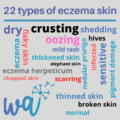If you’ve got eczema, you’ll have been asked this time and time again.
“What caused that skin flare?”
It’s something I was asked constantly throughout my topical steroid withdrawal journey. It’s a bit of a trigger because we can never be 100% certain about anything. There can be so many potential triggers and skin can flare up for no reason at all!
And what causes sensitivity to one person might not be a problem for another.
We want to blame something and know the reason
We like to know though don’t we? We need something to blame, even if that’s ourselves for falling off the perfect life wagon and eating something we see as bad!
There are things you can do to help pinpoint causes for some of your skin flare ups. I wrote a blog for the lovely team at Balmonds to help you find out what your skin triggers might be. Check out ‘Identifying your eczema, skin sensitivities and triggers’ here.
I just have eczema…
And if you’re thinking, ‘No I just have awful skin and nothing makes a difference’, I’d urge you to explore this, even if there doesn’t seem to be a correlation. Reactions aren’t always instant, they can build up and they can come and go. It can be more about the overall load your body can cope with; so when you’re stressed, busy, not slept well, menstruating etc. your skin and body may be tested to its limits.
Living with eczema is a detective journey, it’s a job. It’s your unpaid job now to do the best you can for your body, your skin, your mental health and the planet around you.
It’s complex but it’s worth doing the work.

What are my own skin triggers?
I know I have many triggers and it’s taken me a lifetime to slowly work out what they are. So here you go, my skin flare triggers are:
- Sugar – too much and my skin itches like crazy. I’m trying to eat natural sugars if I need the sweetness, like maple syrup, honey, dates, banana etc.
- Processed food – by this I mean anything with fillers, emulsifiers, bulking agents and really any ingredient you don’t recognise. The weird things like e numbers and methyl cellulose, calcium propionate etc. I do eat some processed foods if, and only if, I know the ingredients and they’re all real foods that I would know and buy myself. e.g. wine, oat takes, falafall from some brands. I’m careful but by avoiding these things I am way less itchy.
- Food Allergens – I am allergic to dairy, nuts, wheat and soya and these foods, if consumed cause anaphylaxis. I often get a skin flare if I eat any by mistake, even trace amounts. I avoid these allergens assiduously but if mistakes happen my skin will likely flare up afterwards as well as the other anaphylaxis symptoms. I will often be covered in hives which can trigger an eczema flare for me also.
- Contact allergens – for me it’s latex, nickel, dust, mould, animal dander (sometimes) for cats, dogs, horses etc. You can manage these by avoiding them but they can 100% trigger eczema on contact with the skin.
- Food intolerances and sensitivities – Certain foods seem to make my itchy or irritate my gut, which in turn can affect the skin function. I avoid tomatoes, celery, broad beans and kidney beans because I get an adverse reaction when I eat them. Not a life-threatening reaction but never good for my skin.
- Diet – I used to stress about food so much, in the blog I wrote for Balmonds (link above) I touch on this because it is complex. None of us are the same and what affects my skin may not affect yours. Some foods can vasodilate the skin which is potentially a nightmare for the already inflamed eczema person. Do the research and experiment.
- Diversity – A lack of diversity in our diet can lead to poor gut health, and in turn tired, dry and itchy skin. I’ve started to ‘eat the rainbow’ so I’m trying new different coloured plant-based foods and trying to eat as much raw salad and vegetables as I can. Download my ‘Eat the Rainbow’ challenge. They’re easier for the body to digest than protein and carbs and it’s going to provide more diversity for your gut. It’s a minefield though so be aware of whether you flare when eating new foods by keeping a Food, Mood and Symptoms Diary. Download your Free Food Diary tracker here.
- Alcohol – In moderation I can drink most alcohol though the more sugar the more likely I am to flare. Even the dehydration caused by alcohol can trigger a skin flare for me. I seem to be OK if I have one or two drinks and can get away with the odd binge, though obviously none is best. It causes inflammation in the body and so puts pressure on other body organs. If you can avoid alcohol, great! But if you want to have the odd drink, don’t beat yourself up about it. For instance I know red wine can be bad for my skin, but I like red wine. Call me stupid but I still enjoy a glass or two or vin rouge; but things like prosecco, gin or vodka can be less of a burden to your skin and body organs.
- Indoor air quality – this one is so important and I think might surprise many of you. Everything in your indoor environment could build up and affect your body and skin function. Not just the obvious dust, mould, but also what you clean your house with, candles can be really toxic (switch to beeswax, natural soya candles or oil burners) This is a huge topic and one I want to write more about in the future. Even just making sure you open a window, every day, even in winter, to get air circulating can make a difference. Plug in air fresheners, too much dust, candles and using strong cleaning products can trigger a flare for me. I’ve started switching to natural cleaning products.
- Hay fever and airborne allergens – obviously what’s in the air outside can have a dramatic effect if it gets onto your skin, like pollution, allergens, hay fever, dust, etc. and you can’t control that, apart from moving house! You can cover up though on high pollen days with a very wide brimmed hat, long sleeves or a shawl and a parasol or umbrella.
- Stress – If I’m over stressed, be it busy and excited or over worked and finding it overwhelming, my skin responds with inflammation.
- Anxiety – Every time I’m anxious I’ll be itchy… always! Learning to meditate, slow my breathing, find distractions, practise self-care, self-love and really learn to be present and be grateful has helped me remain calm during flares and know that nothing stays the same. Everything changes.
- Exercise – this is key for me but it’s a balance. Going for a run and getting sweaty can cause inflammation, overheating and acid burning from the sweat. But that doesn’t mean I avoid exercise, except on really hot days when I just melt. I have ice packs ready, cold water, stand in front of a fan and have learnt what I need to do to minimise damage, yet still be active. My mental health is terrible when I can’t run, walk etc. so I try to prioritise what I can do and make sure I am consistent.
- Doing too much – I know that I need a lot of rest, if I go out a lot my skin, mental health and gut health suffer. It’s important for me to prioritise quality time for relaxation. That could be different for everyone. What helps me is a daily walk in nature, yoga, meditation, journaling, relaxing in a dead sea salt bath, reading, early nights or catching a film on netflix. Learning to say no sometimes has been a valuable lesson. Your friends will still love you even if you decline some invitations to go out with them. They’ll probably love you more for being honest with them.
Over thinking could be making things worse
The more stressed out you get about your skin and what’s going on, the more stressed you will become. It’s a thankless task and can feel like nothing you’re doing to help makes a difference. Then there is a tendency to give up trying because it’s just too hard. Try not to become obsessed. If you want to try to work things out, choose one thing at a time and start to tune into that inner voice. Deep down our bodies know what’s good and bad for it but it can be hard work doing that extra leg work and taking better care of ourselves. Find ways that you can enjoy, stick to and maintain. Simple is often better than complex.
Choose simpler solutions

For instance, taking a whole raft of supplements might not be making a whole lot of difference, and in fact some may just be going straight through you with little or no effect or even making you worse. Think really carefully about the supplements you take and perhaps just choose one to take for a month to see if it helps. They can also be very expensive! I choose things that are more natural so I take an Alfalfa supplement that is packed with calcium. Liquid tinctures can also work better and be absorbed and used easier in the body – so I choose Floradix magnesium tonic instead of a pill. I can’t advise you what supplements, if any, you should take. If you are interested try to get your levels tested and find a specialist who can help you. I have got a lot of my knowledge from Rebecca Bonneteau The Eczema Expert.
Stop trying to fix everything
Related to the previous paragraph, I used to throw everything at healing. Not only does that become expensive but you have no idea what’s helping from the slew of products you are eating and putting on your skin. Letting go and accepting my skin as it was gave me a kind of freedom. I didn’t have to like my skin when it flared, but what if I had to live with constantly flaring skin, could I cope with that? What if I never got better? I’m not saying give up, but I am suggesting we take a step back and give ourselves a break. It can feel often like everything makes us flare and nothing makes a difference, but I know that my eczema isn’t just a thing I have to live with. Slowly I am taking back control but I’m trying not to beat myself up and make life unbearably stressful.
Learn to manage skin flares
As I discuss in the Balmonds blog – How to find your skin flare triggers (linked above) it can just be ebbing and flowing and itchy skin for no reason at all. Learn to let it be and manage the itch rather than endlessly looking for something to blame and answers to impossile questions.
I’d love to know what your skin triggers are? How did you discover them? and has anything in this blog helped?
You might also enjoy reading
- The best washing powders for eczema skin
- Seven natural bath treatments for eczema
- Patch testing for eczema and allergy triggers
Photo by Kristina Nor: Pexels











Leave a Reply